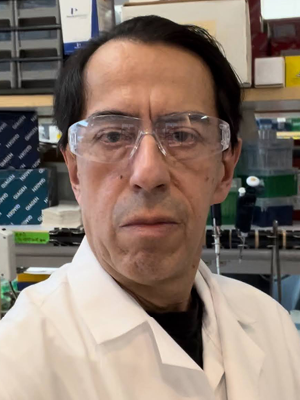
Welcome. The central focus of this laboratory is to examine molecular mechanisms involved in the folding, trafficking, and targeting of newly-synthesized endocrine secretory proteins.
Projects currently concentrate on two cell types relevant to issues of health and disease:
- pancreatic beta cells that store insulin in secretory granules for release to the bloodstream in response to an increase in blood glucose or other secretagogues, and
- thyroid epithelial cells that use thyroglobulin (Tg) as a precursor for iodination in the synthesis of thyroid hormone. In these cell types, the lab is particularly interested in protein interactions that allow the secretory pathway [comprising the endoplasmic reticulum (ER), Golgi complex, secretory vesicles, as well as organelles of the endosome-lysosome-autophagosome system] to optimize production of polypeptide-derived hormones.



Research
Secretory Protein Folding, Sorting, and Targeting
1a). We are investigating proinsulin folding in the endoplasmic reticulum (ER). Recent evidence strongly implicates that proinsulin misfolding takes place in various genetic forms of diabetes mellitus. As a flagship example, we are investigating mutations in the coding sequence of preproinsulin, which (depending upon the particular mutant allele) trigger autosomal dominant diabetes that can begin as early as the neonatal period or as late as young adulthood. We have named this disease as Mutant INS gene-induced Diabetes of Youth (MIDY). We have been characterizing the misfolding of various MIDY mutants as well as exploring the molecular mechanisms by which the mutant proinsulin impairs production of insulin derived from the nonmutant INS allele. As a model, we examine mice bearing one of several MIDY mutations in just one or two of the four alleles encoding mouse insulin.
1b). We are interested in the most common form of diabetes known as "type 2" diabetes. We have identified misfolded isoforms of proinsulin by virtue of mispaired disulfide bonds, and examined interactions of these misfolded forms with endoplasmic reticulum (ER) molecular chaperones. Our evidence suggest that the formation of intermolecular disulfide-linked proinsulin complexes occurs even before the initial onset of diabetes in the db/db (leptin receptor-deficient) diabetic mouse. The misfolding appears to occur within the ER, and is linked to an increase in markers of ‘ER stress’.
1c). We are interested in early aspects of preproinsulin biosynthesis, including initial translation of the INS mRNA, leading to the translocation of newly-synthesized preproinsulin from the cytosol across the ER membrane to enter the secretory pathway. We have been defining the role of various accessory proteins of the ER membrane that assist in preproinsulin translocation.
1d). We are concentrating on ways to modulate the ER environment to impact on proinsulin folding, in the hope of developing small molecules that may be of benefit to insulin production, as well as manipulation of ER oxidoreductase activity. We have also developed a fluorescent proinsulin (called hPro-CpepSfGFP) and mice expressing this fluorescent proinsulin exclusively in pancreatic beta cells. The hPro-CpepSfGFP allows for production of authentic human insulin as well as stoichiometric quantities of fluorescent C-peptide, which can be followed by fluorescence microscopy in live mice as a quantifiable measure of pancreatic insulin content. The animals can then be mated to various genetic models of diabetes.
2a). We have been concentrating on humans and mice with congenital hypothyroidism caused by an Endoplasmic Reticulum Storage Disease as a consequence of expression of misfolded mutant thyroglobulin (Tg). Many human families have been described with the disease, and the thyroglobulin mutations in these families are known. We cloned the mutation causing congenital goiter in cog/cog mice, and this involves a single amino acid change contained within the carboxy-terminal cholinesterase-like (ChEL) domain of Tg. This same domain is also involved in cases of human hypothyroidism, as it functions as an intramolecular chaperone for the upstream part of the Tg protein.
2b). Congenital hypothyroidism in the rat dwarf (rdw/rdw) is also caused by a single point mutation in the ChEL domain. However, the dwarf rat develops an unusually hypoplastic (small) thyroid gland despite an increased in the blood levels of the growth promoting hormone known as "thyroid stimulating hormone" (TSH). We have been concentrating on the hypothesis that, as a consequence of expression of the mutant Tg protein, thyroid cell death from ER stress occurs in mice, rats, and humans with the disease.
2c). Congenital hypothyroidism from homozygous mutant TG gene is uncommon but heterozygotes are quite common in the human population although they routinely go undiagnosed. We find that heterozygous expression of mutant mouse Tg protein already triggers dramatic ER stress from the accumulated misfolded secretory protein. Studies indicate that the mutant Tg protein is not so easy to completely degrade. The degradation process known as ERAD (ER-associated degradation), is under active investigation in our mouse models.
2d). Each individual monomer of Tg is stabilized by a large number of intramolecular disulfide bonds. Tg is ultimately a homodimeric protein. Our recent studies suggest that Tg secretion, and some thyroid hormone synthesis, depends upon a dimeric structure. We are particularly interested in further understanding the formation and importance of various specific Tg disulfide bonds.
Lab Members

Peter Arvan, MD, PhD
Principal Investigator
Chief, Division of Metabolism, Endocrinology & Diabetes
[email protected]

Maroof Alam, PhD
Postdoctoral Fellow
[email protected]

Anoop Arunagiri, PhD
Research Investigator
[email protected]

Leena Haataja, PhD
Associate Research Scientist
[email protected]

Dennis Larkin
Laboratory Supervisor
[email protected]

Rubing Shao
MD/PhD Student
[email protected]

Crystal Young
MD/PhD Student
[email protected]

Hao Zhang
Lab Technician
[email protected]

Xiaohan Zhang, MD
Postdoctoral Fellow
[email protected]
Undergraduate Students
Rawan Antar
Sami Bazzi
Emma Mastroianni
Grants
- Modifiers of Proinsulin Influence T2D Susceptibility, NIDDK
- Multidisciplinary Training Program in Basic Diabetes Research, NIDDK
- Peptide Hormone Sorting to the Secretory/Storage Granule, NIDDK
- Secretory Pathway Protein Degradation Maintains Insulin Biogenesis + Secretion, NIDDK
- A Stress-Induced Vicious Cycle in the Development of T1D, NIDDK
- Thyrocyte Protein Transport to the Cell Surface, NIDDK
Recent Publications
Structural features of thyroglobulin linked to protein trafficking.
Citterio CE, Kim K, Rajesh B, Pena K, Clarke OB, Arvan P. Protein Sci. 2023 Nov;32(11):e4784. doi: 10.1002/pro.4784. PMID: 37717261
Nutrient-dependent regulation of β-cell proinsulin content.
Xu X, Arunagiri A, Alam M, Haataja L, Evans CR, Zhao I, Castro-Gutierrez R, Russ HA, Demangel C, Qi L, Tsai B, Liu M, Arvan P. J Biol Chem. 2023 Jul;299(7):104836. doi: 10.1016/j.jbc.2023.104836. Epub 2023 May 19. PMID: 37209827
Perturbation of endoplasmic reticulum proteostasis triggers tissue injury in the thyroid gland.
Zhang X, Young C, Liao XH, Refetoff S, Torres M, Tomer Y, Stefan-Lifshitz M, Zhang H, Larkin D, Fang D, Qi L, Arvan P. JCI Insight. 2023 Jun 22;8(12):e169937. doi: 10.1172/jci.insight.169937. PMID: 37345654
Integration of ER protein quality control mechanisms defines β cell function and ER architecture.
Shrestha N, Torres M, Zhang J, Lu Y, Haataja L, Reinert RB, Knupp J, Chen YJ, Parlakgul G, Arruda AP, Tsai B, Arvan P, Qi L. J Clin Invest. 2023 Jan 3;133(1):e163584. doi: 10.1172/JCI163584. PMID: 36346671
IER3IP1 is critical for maintaining glucose homeostasis through regulating the endoplasmic reticulum function and survival of β cells.
Yang J, Zhen J, Feng W, Fan Z, Ding L, Yang X, Huang Y, Shu H, Xie J, Li X, Qiao J, Fan Y, Sun J, Li N, Liu T, Wang S, Zhang X, Arvan P, Liu M. Proc Natl Acad Sci U S A. 2022 Nov 8;119(45):e2204443119. doi: 10.1073/pnas.2204443119. Epub 2022 Nov 2. PMID: 36322741
Defective Thyroglobulin: Cell Biology of Disease.
Zhang X, Young C, Morishita Y, Kim K, Kabil OO, Clarke OB, Di Jeso B, Arvan P. Int J Mol Sci. 2022 Nov 6;23(21):13605. doi: 10.3390/ijms232113605. PMID: 36362390
Proteasomal degradation of WT proinsulin in pancreatic beta cells.
Xu X, Arunagiri A, Haataja L, Alam M, Ji S, Qi L, Tsai B, Liu M, Arvan P. J Biol Chem. 2022 Oct;298(10):102406. doi: 10.1016/j.jbc.2022.102406. Epub 2022 Aug 19. PMID: 35988641
Maintaining the thyroid gland in mutant thyroglobulin-induced hypothyroidism requires thyroid cell proliferation that must continue in adulthood.
Zhang X, Malik B, Young C, Zhang H, Larkin D, Liao XH, Refetoff S, Liu M, Arvan P. J Biol Chem. 2022 Jul;298(7):102066. doi: 10.1016/j.jbc.2022.102066. Epub 2022 May 23. PMID: 35618019
The Role of TRAPγ/SSR3 in Preproinsulin Translocation Into the Endoplasmic Reticulum.
Xu X, Huang Y, Li X, Arvan P, Liu M. Diabetes. 2022 Mar 1;71(3):440-452. doi: 10.2337/db21-0638. PMID: 34857543
Therapeutic opportunities for pancreatic β-cell ER stress in diabetes mellitus.
Yong J, Johnson JD, Arvan P, Han J, Kaufman RJ. Nat Rev Endocrinol. 2021 Aug;17(8):455-467. doi: 10.1038/s41574-021-00510-4. Epub 2021 Jun 23. PMID: 34163039
View all Dr. Arvan's Publications
In the News
- Dr. Peter Arvan - Unraveling the Manufacturing Process - Department of Internal Medicine News, January 2020
- How Proinsulin Misfolding Is a Prelude to Type 2 Diabetes - Michigan Medicine Health Lab, October 2019
- Is Type 2 Diabetes Reversible? - U.S. News & World Report, April 2019
- Researching Proinsulin Misfolding to Understand Diabetes - Michigan Medicine Health Lab, November 2016
- Weird Aches, Dry Skin, Horrible Fatigue, Puffy Face: I Had a Thyroid Problem - The Washington Post, May 2016
- Shining a Light on Pancreatic Insulin - Michigan Medicine Health Lab, March 2016
Contact Info. & Useful Links
Contact Information
University of Michigan Health System
Brehm Center for Diabetes Research
1000 Wall Street, 5th floor Brehm Tower
Ann Arbor, MI 48105
Campus Address: Suite 5100 Brehm Tower, SPC 5714
Peter Arvan, MD, PhD
[email protected]
Emily Fullerton, Division Chief Assistant
phone: (734) 615-9497
fax: (734) 936-6684
[email protected]



